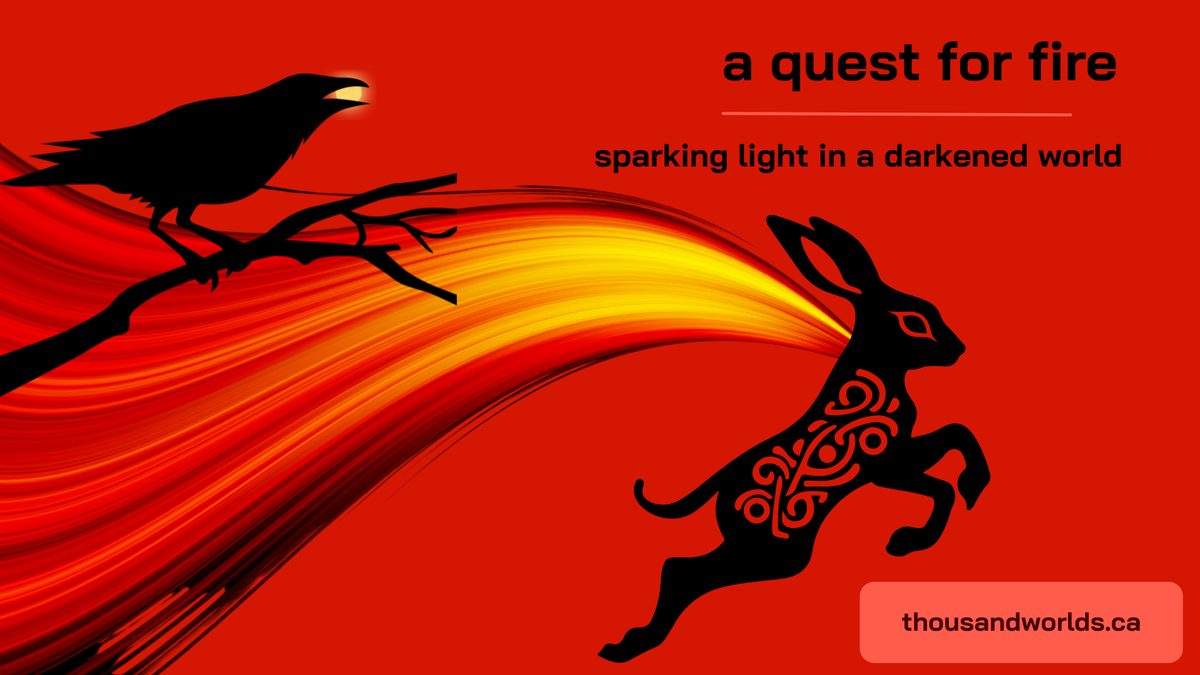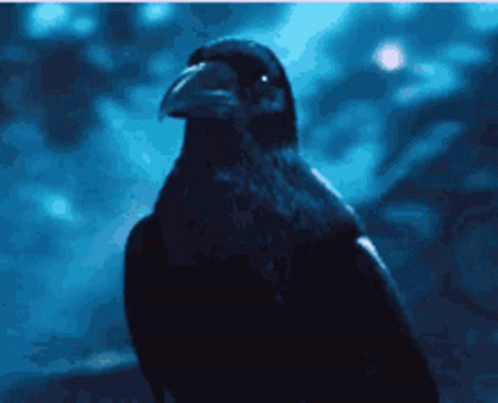Quest for fire

There are so many stories around the world about fire, and more often than not it is about the theft of fire from those who have it by those who need it. Prometheus famously stole fire from the gods of Olympus and gave it to humans, the gods then condemning him to an eternity of having his liver eaten daily by an eagle, the human liver of course having regenerative qualities making this a lengthy torment. Fire is the begining of world-making. It is knowledge and technology. Prometheus is not just a symbol for human striving, but a cautionary tale for those who would reach for things the gods don't want us to have. Don't get above your station, accept the story that the powerful tell.
There is also a Haida story about Raven stealing the sun. Tired of blundering about in the darkened world, Raven discovers an old man who lives with his daughter and the great treasure they hid in a tiny box nested within other boxes: all the light in the universe. Raven played a very long game in order to get into that house with a position of trust that would allow him access to that box. The old man scolded and threatened, but eventually Raven cajoled the old man into allowing the child he believed to be his grandson to hold the light just for a minute. And that's all it took. Raven revealed his true form, captured the sun in his beak, and escaped into the darkness scattering the light across the sky.

This story of Nanabush stealing fire is more like the Haida story of Raven than it is like Prometheus. Prometheus was a man who stole fire from the gods. Raven and Nanabush are powerful spirits who stole fire from old men and the women who protect them. All are stories about restoring balance, offering us a model for resurgence and action in a darkening world where direct action is going to have to be bold and strategic. No quick wins, we're going to have to play a long game. So here's the story, it comes from the William Jones collection. I don't see the story among those collected by Ningewance or Murdoch.
You'll recall that last time we had the story of Nanabush's birth, the death of his mother, and the brothers who ran, hopped, or rolled away leaving him to be raised by his grief-stricken Nokomis. This story begins with "so accordingly then did the old woman bring him up." which is an interesting way to start. Just like that. They've all ran, hopped, or rolled away after their squabbling over who would be first killed their mother, except for Nanabush who was a blood clot which is kind of gross but that's the story.
Nanabush is an inquisitive manitou, and he asks his grandmother about some people, over there, do they not have fire? Oh yes she says, they do have fire. Please, please, please let me go and get that fire Nokomis! No she says, you can't get the fire because they keep a careful watch over it. It's not possible. The father is always around, only the daughters go outside. These are the details Nanabush needs and he says to his grandmother, get ready because I can do this.
Nanabush is not only inquisitive, but he has some powers and sets about manifesting the reality he needs to accomplish this task. I want the lake to be frozen solid. I want to become a hare. I want the woman to come get some water. I want her to find me and take me home. And all these things happen. The lake freezes solid, Nanabush takes the form of a hare, and the woman does indeed come to the edge of the lake for water and finds him all soggy and bedraggled, tugging at her heartstrings.
The girls are, naturally, smitten with this soggy little bunny and make a pet of him. As all fathers everywhere, theirs is skeptical about this pet they've found. He warns them that his waterlogged rabbit could be a manitou. They are credulous, scoffing how is it possible for a manitou to be a little bunny? There is some back and forth about you have no idea what's possible and maybe you should respect your father and the wisdom in his old bones, but to no avail. They sit by the fire and continue to dry this little creature who makes one more wish: that a spark would fall on him. And it does.
As soon as that happens Nanabush takes off and runs outside. The old man tries to chase him in his canoe but Nanabush had already turned the water into ice so all they can do is watch helplessly while this little rabbit, burning with fire, hares off across the ice. Breathless, he gets to his house and begs his grandmother, who had laid some kindling just in case her grandson accomplished this thing, to rub the fire off of him. And she does.
In a version of this story told by Dorothy M. Reid in her book Tales of Nanabozho, Coyote had already obtained fire from the underworld and brought it to the people but it almost burned the forest down. As a result, the people were all hell no, and appointed an old warrior-magician to guard it along with his two daughters. Reid was a white woman, a children's librarian, who collected these stories and published them in 1963, and it does add an interesting pre-story. It wasn't simple curiosity that provoked Nanabush, it was pity for his grandmother who was struggling with the cold and eating frozen meat just as pity and compassion drove Raven to take the actions he did. Furthermore, Nokomis had reason to warn her impetuous grandson about the old man. Nanabush might be a manitou, but his target was an old magician with powers of his own. Others had tried and failed to get fire from him.
In her charming memoir, The Tao of Raven, Ernestine Hayes (Tlingit) tells her own story through the story of Raven stealing the sun, and near the end she reflects on how the old man felt when Raven, who had tricked him into thinking he was his grandson, stole his treasure. She reflects on how the daughter may have felt, after carrying this child in her womb and raising him, the grief and heartache of giving themselves to somebody who betrayed that care. Where is Raven's compassion, Hayes asks.

We could ask the same of the woman and her daughters, how did they feel having rescued this pitiful little rabbit only to have the old man proved right as Nanabush absconded with fire. It's the wrong question of course. We generally ask the wrong questions when we ignore power imbalances, when we treat people and situations as equal. If we ignore the ways that inequality exists and decide to just treat everyone as equal, then we just entrench those inequalities, those imbalances. And worse, we find ourselves blaming the victims of these systems for not doing better now that everything is equal. Which of course, it isn't. There is a long tradition of old men hoarding power, and women protecting them.
"It is easy to blur the truth with a single linguistic trick ... Start your story with "Secondly," and the world will be turned upside-down. Start your story with "Secondly," and the arrows of the Red Indians are the original criminals and the guns of the white men are entirely the victims. It is enough to start with "Secondly," for the anger of the black man against the white to be barbarous. Start with "Secondly," and Gandhi becomes responsible for the tragedies of the British.”
― Mourid Barghouti, I Saw Ramallah
Begin the stories of Prometheus, Raven, and Nanabush with secondly and their actions appear may thoughtless or self-interested. We focus on the old man and the women who protect him, think about their grief. Begin them a few steps earlier, with the power of gods to hoard knowledge, or the power of a magician to hoard the sun, or the fear of people unwilling to learn something new and you get a different story. You redirect your compassion towards those who lack the most basic things because of the old man and the women who protect him.
Hayes answers her own question by pointing us towards Raven's trust in the world itself as well as his own nature. She points us to Raven's desire to light the world, his concern for people who are so accustomed to the darkeness that they don't even see their need for light. Nanabush too, the people may be afraid of the power that fire has to cause harm but he believes in their capacity to learn. Like Raven, he trusts in the world as well as his own nature. He trusts his Nokomis to be ready.
Then Hayes returns to the old man to see if he is learning to see the world as it is, rather than how it once may have been, to the daughter grieving a simpler time when she didn't know who Raven was.
It has a ring of making America great again, doesn't it, this grieving for a simpler time, because when somebody says to make it great again you have to ask them who was it ever great for? And the simpler time that the daughter is grieving wasn't even real. It had always been Raven. She wants to go back to a time that never existed, a time when she did not see the world as it was and that can be deeply comforting, the desire to go back to not knowing, particularly if you benefitted from that not knowing.

We are a people living in darkness, afraid of fire, isolated from power, and afraid (legitimately) of consequences. Just keep your head down, worry about your own, and you'll be fine. These stories make me think of the wilful ignorance that I wrote against in Becoming Kin and our desire to forget uncomfortable things. There's a deliberateness to this kind of collective forgetting isn't there, a willful desire to move forward as if the thing never happened. Because I might forget something but somebody else will remind me. To shape the collective forgetting of an entire people takes some planning. It is a particular choice to tell the story again, but begin with secondly so that you flip it upside down and the bad guys become innocent victims. That's a choice, a choice that all to many people are making in schools and libraries, in churches and political spaces. People with the authority to shape such stories and those who protect them.
There's things we don't know about this Nanabush story. Things perhaps left to our imagination so we can see ourselves where we need to. Why did the people give up so easily when the fire became dangerous? Who were the leaders who forbade it's use and the learning that would inevitably come? What motivated them? Or is that just the story that the old magician tells to explain why he has something that nobody else has. It is amazing, the autonomy we will give up for the illusion of safety. The darkness we are willing to accept, if not for ourselves then certainly for those we have decided wouldn't know what to do with fire anyway.
And what of our fire-stealers? Those who, through strategic and thoughtful planning find a way to restore something to the people, to people who have become accustomed to the cold darkness. Nanabush was not the first to attempt it, others had tried and failed. Perhaps he heard their stories, Nokomis telling them while they huddled in their wigwam listening to the wind howl outside. Maybe those stories are what shaped his own strategy, learning from the failures of others. Movements do this as well. We learn from those who tried and failed, as well as those who tried and succeeded only to have their victories rolled back through criminalization or legal challenges.
Like Nanabush, we can't manifest the end result, but we can imagine the strategies that will get us there. We can, through sharing stories about what worked and what didn't, develop new ideas for ways to wrest power and resources from those who hoard it and the ones who protect them. Prometheus is a cautionary tale. The powerful does not relinquish power easily and there are consequences for grasping the tools of liberation. But we need people who will be driven towards compassion for a people living in darkness. We need, as Mariame Kaba says, a million experiments.
Would that we all wish for that small spark to alight on us too.


And don't forget to join up with the Nii'kinaaganaa Foundation. Every month we collect funds from people living on Indigenous land and redistribute them to Indigenous people and organzers. You can find out more information on the website. Donate via Patreon or PayPal!
